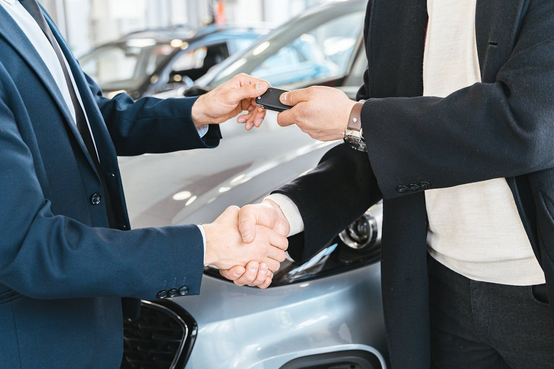When it’s time to upgrade, deciding to trade in your car can seem like the easiest solution. Hand over your old car, drive away in the new one, and let the dealership take care of the details. Simple, right?
But convenience often comes at a cost, and that cost is usually taken straight off your car’s value. While trading in your car might feel like the quickest route, it’s rarely the smartest. Here’s why, and what you can do instead.
What Really Happens When You Trade In Your Car
When you trade in your car, the dealership isn’t buying it because they love your model - they’re buying it to resell. That means they need to make a profit on the transaction.
To do that, they’ll offer you below the market price. Your car’s trade-in value is based not just on condition, mileage and demand, but also on how much margin the dealer wants to build in. Even small scratches or cosmetic wear can knock hundreds off your offer, and those deductions add up fast.
So while trading your car in might feel like a tidy deal, it’s one that’s usually stacked in the dealer’s favour.
The Hidden Cost of “Convenience”
Car dealers are experts at making the process feel smooth. They take care of the paperwork, handle the inspection and deduct the car trade-in value directly from your new purchase price. But that convenience can mask the reality, you might be leaving thousands of dollars on the table.
If you were to sell your car yourself, you could access its true market value. The trade in vs private sale gap can be significant - especially for well-maintained, popular models where buyer demand is high. Want to know your car’s value and learn about depreciation? Have a look at AA’s valuation tool or look into similar vehicles online to get an idea.
It’s worth asking yourself: are you paying too much for the sake of saving time? Or is there another solution?

When NOT to Trade in Your Car
A trade-in might suit you if your main priority is speed. But there are plenty of situations where it makes sense to walk away from that option entirely.
You shouldn’t trade in your car when:
It’s still in great condition with low kilometres
You have a full service history or recent maintenance
The model is currently in demand
You’re not in a rush to buy your next vehicle
You want transparency over what your car is truly worth
In these cases, selling directly almost always yields a better outcome - both financially and in terms of control.
Trade In Your Car vs Private Sale: Which Is Better?
Let’s break down the pros and cons:
Situation | Trade-In | Sell Directly |
Need to upgrade quickly | ✅ Convenient | ❌ May take longer |
Want the best return | ❌ Lower value | ✅ Higher sale price |
Don’t want to deal with buyers | ✅ Simple | ❌ Requires some effort |
Care about transparency | ❌ Hidden costs | ✅ Clear market offers |
So, should I trade in my car or sell it privately?
It really depends on what matters most - speed or value. But for most Kiwi drivers, there’s now a third option that combines both.
A Smarter Way to Sell
Instead of handing your keys to a dealer, we at AutoFlip connect you directly with trusted buyers nationwide and can sell your car quickly. You’ll get real offers, not lowball trade-in prices, and you stay in control of the sale.
Why take one dealer’s word for it? AutoFlip puts your car in front of dealers all over New Zealand, so you can get the best offer from a pool of hundreds of buyers
There’s no dealership markup, no haggling and no guesswork around your car trade in value. Just top notch offers, transparent fees and a process designed to save you time without costing you money.
If you’ve ever wondered whether it’s better to trade in your car or sell it, this is your answer - sell smarter, not cheaper.
The Bottom Line
Trade in your car? It might feel easy, but it’s rarely the best deal. You’re effectively paying for convenience with your car’s equity. Before you sign that trade-in agreement, take a moment to find out what your car is really worth on the open market.
The difference could be thousands, and that’s money better spent on your next vehicle, not the dealer’s bottom line.
Skip the trade-in traps. Get real offers from trusted NZ buyers with AutoFlip - and sell your car the smarter way.
Trading Your Car In: Frequently Asked Questions
1. When not to trade in your car?
You should avoid a car trade in when your vehicle is in good condition, has low kilometres, or is a popular model with strong resale value. In these cases, selling privately or through a verified online platform will almost always return more money than a dealer trade-in.
2. Should I trade in my car or sell it myself?
If you value speed and simplicity, to trade your car in may suit. But if your goal is to get the most money for your vehicle, it’s usually better to sell it yourself or use a service that connects you directly with buyers. This way, you can access the true market value of your car rather than a reduced dealer offer.
3. How is car trade-in value calculated?
A car's trade in value is based on the vehicle’s age, mileage, condition, brand demand, and how much margin the dealer wants to make when they resell it. Dealers typically offer less than market value so they can cover costs and generate profit on the resale.
4. Is it better to trade in or sell your car?
In most cases, it’s better to sell your car - you’ll usually earn more and have greater control over the process. Trade in your car? It might save time, but it often means losing hundreds or even thousands compared to what your car could sell for privately or through a transparent selling platform like AutoFlip.



